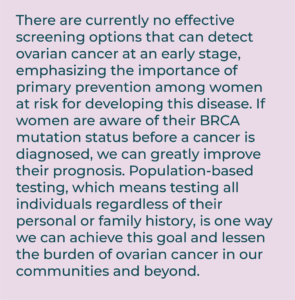
I am part of a large team of scientists, collaborators, research staff, and trainees at Women’s College Research Institute (WCRI) in Ontario, Canada dedicated to improving the management continuum of women who are at a high risk for breast and ovarian cancers. Much of our team’s research focuses on women with a BRCA1 or BRCA2 mutation who face significantly increased risks of developing those cancers.
Approximately 20% of ovarian cancers are attributed to a BRCA1 or BRCA2 mutation. Fortunately, women who know they carry either mutation are able to make evidence-based decisions to prevent this fatal disease with risk-reducing surgery. By identifying mutation carriers and offering them timely preventative surgery we can help prevent ovarian cancer from starting. Our ongoing study at Women’s College Hospital, The Screen Project, offers genetic testing for these BRCA gene mutations to anyone in Canada irrespective of their family history.
Unfortunately, surgical removal or the ovaries and fallopian tubes, called bilateral salpingo-oophorectomy – remains the only effective way to prevent ovarian cancer and improve survival in this population. We are working closely with women who are BRCA mutation carriers and are undergoing oophorectomy, to collect valuable information on quality of life, menopausal symptoms, bone health, and other non-cancer outcomes following preventive surgery. This allows us to offer evidence-based management options to help alleviate both the short- and long-term effects of early menopause that result from this surgery.
As part of a large international collaborative study, we have the power to produce high quality data that can be implemented worldwide for the greatest impact. Our deepening understanding of hereditary cancers at a fundamental level will ultimately help us to deliver personalized strategies to improve women’s health through lower incidence and mortality rates globally. We continue to evaluate the role of several risk factors, including hormones and reproductive factors, as well as screening, on the risk of developing or dying of this disease.
Lately there has been widespread interest in studying the fallopian tubes as the origin site for some ovarian cancers – a very new area of research that is currently understudied. Some experts have proposed that just removing the fallopian tubes, called salpingectomy, may prevent some cases of the disease. Our team at WCRI recently received funding to investigate how this procedure impacts ovarian cancer risk and outcomes in women with either a BRCA1 or BRCA2 mutation. These critical findings will ensure that only highly effective prevention options are offered to this high-risk population.



